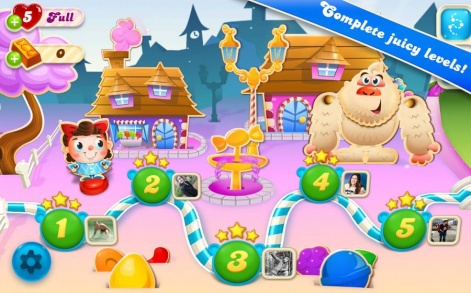The games industry plays host to a diverse cast of characters, from artists and coders to narrative designers and studio heads.
The skills to pull off these roles are complex, with each position requiring mastery in its field.
To highlight some of the brilliant work that goes on behind the screen, and help others who may be keen to dive in, PocketGamer.biz is reaching out to the individuals who make up the games industry with our Jobs in Games series.
This time we spoke with King's senior studio art director for Candy Crush Kiki Olofsson.
PocketGamer.biz: Can you tell us about your current role?
Kiki Olofsson: Hej! My name is Kiki and I work as a senior studio art director for the Candy Crush series (Candy Crush Saga and Candy Crush Soda Saga) in Stockholm. My role involves both people management and product development.
People management involves, for instance, performance reviews, recruitment and talent management.
Product development is mostly visual development; I look after and make sure we further develop Candy Crush tactics and strategy to ensure consistency and the best possible experience for the player.
Apart from my studio role I also drive a dear side project. Together with a colleague I have created a training programme and invented a digital tool - the “Diversity Space Tool” - currently in development, to empower game developers to create more inclusive game characters.
It’s about time to break the norm and become more innovative and inclusiveKiki Olofsson
It’s about time to break the norm and become more innovative and inclusive, as people should be equal in our society and we should all be equally represented in the media we consume.
How did you first get into games and how did you progress into the role?
I attended my first multimedia programme at a university level in Sweden in the mid-90s and before we had finished our studies, companies were offering us jobs.
The industry was new, hot and very few had the skills that IT companies were looking for.
My first job was as a graphic designer in a multimedia studio where we created CD-ROM games for children. After that, I worked at a communications company developing gamified education, before I joined King.
In my first seven years at King I worked as an art director and artist, creating about 25 games for our skill game site.
After five years, I was chosen by the artists to become their manager and I agreed. I really liked the manager responsibilities and realised I was also good at it, so I wanted to focus more on that.
The first big step in my career at King was in 2013 when I became head of art in Stockholm. I was successful in hiring a lot of female artists, during my three years in that role I was able to raise the number of women from 10 to 40 per cent.
I also hired people from all over the world while at the same time King started up studios in London, Barcelona, Berlin, Malmö.

I had the executive sign off for all artist related roles and I tried to make sure we looked at diversity and gender balance, as well as hiring people with values in line with King’s.
In 2016, I earned the global senior director role where I had the opportunity to focus more on implementing key initiatives to support career development, training, recruiting and diversity in King’s art organisation.
During my three years as head of art, I was able to raise the number of women from 10 to 40 per centKiki Olofsson
After working for many years with a focus on talent management, I wanted to work with product development again.
For a couple of years, I worked with visual development in the Candy Crush franchise. The purpose was to align the usage of the Candy Crush IP across our various new projects to ensure consistency and strengthen the brand.
Earlier this year, I jumped back into the game studio because I felt that’s where I was most needed. It feels great to work with our live products again!
Is it something you ever imagined yourself doing?
No, not at all. I must confess: I ended up in the gaming industry by coincidence.
I grew up in Luleå, a small steel industry city in the north of Sweden and I studied economics and languages in high school.
I have always been creative but to have a creative career was something I did not think was possible.
My plan was to work with something traditional like economics or tourism. What’s good is that I can still type really fast without looking at the keyboard and speak French (but not at the same time).
What did you study (if anything) to get your role? What courses would you advise for aspiring professionals in the area?
The university’s multimedia programme was very theoretical and our degree was in behavioural science. Looking back, I know I didn’t choose the best way forward. So, in my case my natural talent has been vital for securing my different roles.
I have always been creative and driven, as from a young age I explored using different types of media to express myself and I have naturally taken the lead role in all kinds of projects and situations.
If you are aiming at a creative artistic role now, I would choose an art school and then a niche practical craft school for game art or a design school or similar if you are more interested in UI or graphic design.
Many schools nowadays are great and the game industry is also collaborating with many of them. Getting into the right school will - other than giving you the right skills - give you a very valuable network.
What part of your role do you find most fulfilling?
Being a perfectionist. I have a good eye for what excellent looks like and I just love to fix things for the better. To make things functional and beautiful, to find the sweet overlapping spot.
I enjoy creating, improving and managing almost anything: products, services, workflows, processes, strategies, organisations, environments, relations, information and communication.
I feel huge satisfaction when I have fixed something. I always get excited when I see people playing Candy Crush Saga or other King games. I feel so proud!
Do you think there are any misconceptions, public or professional, surrounding your area of expertise?
I sometimes get the impression that people believe creative people are unstructured and on their own woolly planet.
I’m very structured, rational and strategic and could easily manage other areas than art.
People also believe that creating art is an easy job, you just have fun and draw. There are endless of examples when clients by some reason don’t think they have to pay for an artist’s work.
The best artists have spent years in art schools and work incredibly hard. They have very high expectations of themselves, spending hours after work improving their skills.
Is there anything about the job/industry you wish you would have known when first joining?
I have been lucky and haven’t had many struggles or reconsidered my choices.
I guess I’m quite adaptable to changes and I have always tried to pick workplaces aligned with my own values and interests.
What other advice do you have for someone looking for a job in games?
Work hard, there are no shortcuts. Do some introspection, which natural skills do you have? Sometimes it can be good to focus on what’s easy and comes naturally for you. I often see parallels between American Idol and artists.
Many people have this dream of becoming a visual development or concept artist even though they might lack the talent.
You can still work with art and games but maybe another role suits you much better. There are so many different and interesting roles to choose from.
You can find out what positions King has available via its jobs board.





















